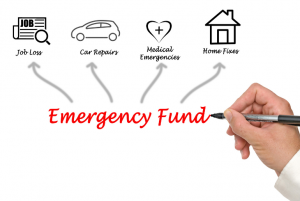Top 7 Financial Goals That Everyone Should Have For 2021
Most people wait for the end of every year, then set new year resolutions, but how effective are these new year resolutions? Most of these are forgotten before the end of quarter one in the new year.
That is why goals are what we should be working on all the time rather than resolutions. These goals should be visited often, with a reassessment of where we are at every 90 days.
Also, these goals should be written down so that we have a visual of them all the time. This keeps us in track.
If you have a goal and do not write it down, it remains a wish or a dream. There is really nothing wrong with wishing, after all, it all begins with a wish, and these wishes turn into desires. But we have to take action to convert that desire to reality.
When it comes to our finances, we need to be more intentional with our goal setting as it is one of the most challenging areas of our lives, requiring effort over a long period of time. Therefore, a plan of action is required.
Let’s start by setting some financial goals for ourselves for 2021.
Here Are My Top 7 Financial Goals I Belief Everyone Should Have For 2021
1) Build your financial freedom funds (generally called emergency funds)
This is generally a short- term financial goal, reason why it is referred to as an emergency fund. I like to be on the more positive side, so I call it financial freedom fund. I can’t tell you how many times an amount kept somewhere has saved me. When I had my first daughter in 2014, I didn’t work for 18 months. I was a stay-at-home mum. There was a time, the landlord had asked us to leave the property on emergency with very little notice and we needed about £3000 for deposit straight up front to move into a new property. These are just a couple of scenario examples that we need that extra set aside to help us.

What is a financial freedom fund?
This is the amount of money you have to live on and fund your normal lifestyle without working. Strive to build your fund to cover at least 6 to 8 months.
Note that even though financial freedom funds are considered short term goal
s, it can be very useful to plan and extend it to the long term. Therefore, strive to achieve this as an ongoing goal, with good planning on how to achieve it. It is an ongoing goal for me, challenging as it is, just a little at a time helps.
A healthy financial freedom fund will bring you the following benefits for life:
It will be there to serve you in unforeseen situations, for example, the loss of your job or an injury
It will help you with your money management. The habit of Saving Money is an education in itself. It teaches us self-denial and broadens our minds. If we can save money for our financial freedom fund, then we can save money for any other financial goal that we may have.
It also keeps your mind at peace if you have any investments you are relying on for those unforeseen days and they are not performing very well at a particular point in time.
Finally, it generally takes the stress out of money and keep your mind worry free since you know there is a reserve somewhere for the unexpected.
With all the above benefits, having a good emergency fund is always a plus, therefore should always be a top priority and an ongoing goal.
2) Pay off and get out of debt

Generally, we have good debt and bad debt. The good debt generally makes us feel better as the purpose of the debt was a worthy one. But let’s not take that for granted and let it linger for too long if we have the opportunity to get it out of our way. The truth is that, if you want to get the most out of your finances, it is an absolute requirement that you get out of debt. Even the good debt will place pressure on our income.
It doesn’t matter how much you earn, if you have this as a goal, you can achieve it, it would take some time, but it is an achievable goal.
When we are not in debt, we just have more control over our money. 98% of my debt is good debt but I am on that journey to clearing it off and I am making it a priority.
The great thing about this goal is that anyone can do it, regardless of income level.
Getting out of debt also means that:
You have more money to add to your financial freedom fund
You have more money to spend on needs without having to borrow and
Your mind is free from money worries and debt stress, which is very important
It is easy to accumulate student loan debt (my family has accumulated a lot of student loans) and credit card debt, but making it a family goal to get out of debt makes it easier to handle as it becomes a family goal and you all are on board to accomplish that goal. Financial decision making as a family takes a lot of pressure off as family finances can be more focused.
Check your credit cards, find the ones with the highest interest rates, check with your bank what offers you may have for 0% interest balance transfers or a lower interest rate money transfer for a fixed term. Take advantage of such offers and lower your interest rate by using the offers to pay off the high interest credit cards. Then make it a goal to pay off the fixed term offer you just used within the term. That is a great starting point.
3) Create Multiple Income Streams
One thing that will help us achieve our financial goals is having multiple streams of income, these are commonly called side hustles to our main jobs.
Challenging as they are to build, stepping out of our comfort zones and taking those steps to achieve something addition to our monthly salary often goes a long way to support us with our income needs.
This should be a financial goal for everybody. It would also help not only financially but also build you up in other areas of your life. Most of these side hustles come with a community that motivates and encourages people and spreads a lot of positivity.
In summary, a side hustle will also:
Help pay off your debt quicker
Provide extra cash to help build your financial freedom fund
Provide you with business skills if you are looking to start your own business but don’t want to quit your job
Just provide that cushion of support and set your mind at peace.
It’s a continuous process. Let’s go!!!
4) Live on less than you earn (generally – living below your means)

This goal could be considered the Grand Father of all the financial goals. Why? Because, unless this is achieved, you could never achieve the other financial goals as those require you having excess income after your spend to use for the other goals, that is, you will have income to:
Add to your financial freedom fund
Pay off debt
Start a side hustle
Invest
Finding ways to increase our income, as stated above should be an ongoing process for us but this can only be possible if we are able to live below our means so that we can have extra to use to improve our lives.
5) Become comfortable with planning for your household if death knocks
This is one goal that is often overlooked by many. Death is real and we see it around us everyday but we fail to make appropriate plans for our loved ones in case something happened to us.
This goal is just to ensure that your loved ones, especially your children are left with something because you were around. Rather than leave your loved ones in total financial stress when you depart, it is a great thing for you to leave them with something that will make life a little better for them.

Suggestions include:
Have insurance in place especially life insurance
Strive to pay off all your debts, that will help not to leave a financial mess for your loved ones to clean up while you are gone
Meet with a specialist accountant to do some inheritance tax planning if you have some good assets
Discuss the options with your family and loved ones
Start teaching your loved ones’ good money management skills as these will help them for the rest of their lives.
Working on our financial goals everyday must become a habit if we are to attain the level of living in financial peace. We must be intentional with our goal setting and work towards achieving those goals.
6) Strive to live below your means
If you spend the money you earn from your salary to buy material things only, instead of buying assets, you are going to be working till your old age if you are blessed to live to a ripe old age before you die.
Learning to live on less than you earn will always be an advantage, it will leave you with more income you can use to cater for all the other goals listed above. This still goes to show us how linked our financial goals are. It is hard to separate them, as you can see, one affects the other.
Living below your means, spending less than you earn leaves you with:
Income to save
To invest and
To pay off debts
It Is worth noting that being on the search for additional income streams is always a great idea. But how can you achieve that if you spend all you earn? You need some income to invest in a new venture. Learn to not live on the gratification of the now for a better tomorrow.
7) Use insurance to cover contingencies
Over the years, I have learned the importance of insurance cover. Recently, my laptop broke, at a time, I could hardly spare £600 for a new laptop given my commitments. But 3 years earlier, I had taken out a cover for my laptop for £165. Over the 3 years, there were several occasions my laptop had issues and that same insurance paid for the repairs. That is a basic example, but I can from experience list a whole lot of savings I have made from insurance coverage.

I know it is a tough one, as we sometimes pay too much but getting a balance is important. Cover the very important things and make it one of your financial goals to do so. Some of the important insurance covers are:
Life Insurance
This is a goal that is congruent to goal number 5. Term life insurance is cheaper especially if taken out at a young age. You won’t believe how low your cover could be if you take it out early. But if you haven’t taken it out, go ahead and get a cover as this also will help provide for your loved ones if something were to happen to you before you reached your retirement age.
Car insurance – this is a legal requirement so ensure you shop around for your car insurance, use comparison websites to guide you to the right level of cover.
House insurance – this could save your home from disaster and other useful elements like plumbing, will safe you money for every call out.
Conclusion:
Write down your financial goals and visit them often to keep on track. We are all guilty of derailing every now and then from our goals, but visiting them often and adding to them will keep us on track.
If you haven’t already done so, grab our free financial success pack below and get the tools you need to take control of your financial future





